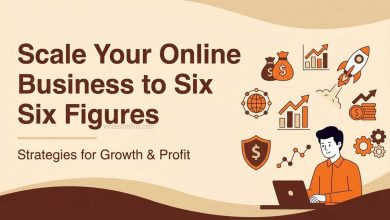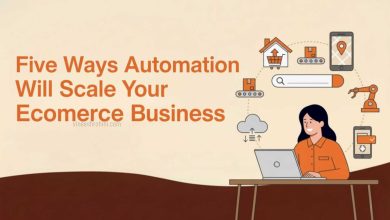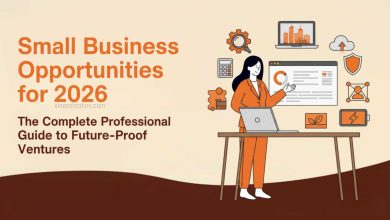The Psychology of Selling in Online Business : Comprehensive Guide 2025
Psychology of Selling : The world of online business in 2025 is not only about innovative platforms, advanced payment gateways, and targeted advertisements but also about deeply understanding human psychology. At its core, selling is not about pushing products; it is about persuading people, building trust, creating desire, and solving problems that resonate with their emotions and rational thinking. The psychology of selling in online business has become the backbone of successful e-commerce strategies, digital marketing campaigns, and high-converting sales funnels.
Table of Contents
With online shopping becoming an everyday habit and competition reaching unprecedented levels, businesses need more than discounts and flashy ads—they need to connect with the consumer’s mind. This comprehensive guide explores how psychology influences online selling, what strategies businesses can use in 2025, and how entrepreneurs can leverage these insights to grow and thrive in the digital marketplace.
Understanding the Psychology of Selling in Online Business

The psychology of selling is the science of understanding what motivates consumers to make purchase decisions. In online business, where customers cannot touch or feel products, businesses must appeal to cognitive and emotional triggers. Unlike physical stores, online selling depends on trust, perception, and persuasion. Every click, every scroll, and every cart abandonment is influenced by psychological patterns.
Also Read : Selling Your Services Online
In 2025, businesses are leveraging artificial intelligence, machine learning, and behavioral data analytics to understand customer psychology more than ever. Still, the fundamental drivers remain the same: human beings make purchase decisions based on emotions first and justify them with logic later. For online businesses, mastering the art of persuasion through colors, copywriting, pricing, design, social proof, and urgency tactics is key to standing out in a crowded marketplace.
Emotional Triggers and Consumer Behavior
Consumers buy with emotions, not just logic. Emotional triggers such as happiness, fear, trust, desire, and belonging play a central role in online sales. For instance, luxury brands use aspiration marketing, creating a sense of exclusivity, while budget-friendly online stores focus on value-driven emotions like affordability and security. Understanding these emotions allows businesses to design personalized campaigns.
In 2025, personalization is the currency of success. AI-driven recommendation engines, behavioral targeting, and interactive experiences have enhanced the emotional connection between customers and brands. When a consumer feels that a brand “understands them,” they are more likely to trust and buy repeatedly.
The Power of Trust in Online Business
Trust is the cornerstone of selling in digital environments. Unlike offline stores, where people can physically verify the product and meet the seller, online business requires trust-building mechanisms. Secure payment gateways, clear return policies, authentic product reviews, and transparent communication all contribute to consumer confidence.
Psychologically, trust reduces the perceived risk of buying. Since humans naturally avoid uncertainty, online businesses must eliminate doubts by using trust signals. In 2025, trust-building extends to ethical business practices, sustainability, and data privacy. Consumers are increasingly choosing brands that align with their values, making authenticity a psychological driver of loyalty and sales.
The Role of Scarcity and Urgency
Scarcity and urgency are timeless psychological triggers in sales. The fear of missing out (FOMO) compels customers to act quickly. Online businesses use limited-time offers, countdown timers, and low-stock alerts to create urgency. From a psychological perspective, scarcity makes a product appear more valuable because human brains associate rarity with desirability.
For example, an e-commerce site showing “Only 2 items left in stock” encourages faster decision-making. In 2025, businesses have refined these tactics by integrating real-time updates and AI-driven scarcity messaging to make urgency more credible and effective.
Social Proof and the Herd Mentality
Humans are social creatures, and our decisions are influenced by what others do. Social proof—reviews, testimonials, influencer endorsements, and case studies—plays a major role in online selling. When customers see that others trust and recommend a product, they are more likely to purchase it.
The psychology behind this lies in herd mentality. In uncertain situations, people look to others for guidance. For online businesses, this means that displaying customer feedback, star ratings, and user-generated content can significantly increase conversions. In 2025, with social media integrated deeply into shopping platforms, peer influence is stronger than ever.
The Role of Pricing Psychology
Pricing is not just about numbers; it is about perception. Pricing psychology uses cognitive biases to make products appear more affordable or valuable. Tactics like charm pricing (₹999 instead of ₹1000), anchoring (showing a higher original price alongside a discount), and bundling (offering more value for slightly higher cost) tap into psychological tendencies.
Consumers perceive relative value, not absolute cost. For example, a product priced at ₹1,499 seems affordable if displayed next to one priced at ₹4,999. Businesses use this psychological principle to maximize sales without compromising profit. In 2025, subscription-based models, freemium pricing, and dynamic pricing driven by AI are reshaping how businesses apply pricing psychology.
The Influence of Website and UX Design
First impressions matter, especially online. Website design and user experience (UX) directly affect consumer psychology. A cluttered, slow, or confusing site creates cognitive overload and distrust, while a clean, fast, and visually appealing site fosters confidence and ease.
Colors, layouts, fonts, and navigation play roles in influencing moods and decisions. For instance, blue conveys trust and professionalism, while red invokes urgency and excitement. In 2025, online businesses are investing heavily in UX design, knowing that psychological comfort leads to higher conversions and lower bounce rates.
Storytelling and Narrative Psychology
Storytelling is one of the most powerful tools in selling. Humans are wired to connect with stories, not abstract facts. Online businesses use narrative psychology to make their products relatable. Instead of just listing features, brands craft stories around how the product changes lives.
For example, fitness brands don’t just sell equipment—they sell transformation stories of people becoming healthier and happier. Stories create emotional resonance, making customers envision themselves using the product. In 2025, immersive storytelling with video, AR, and VR experiences is redefining how brands connect with consumer psychology.
Personalization and Customer-Centric Marketing

Personalization is not just a trend—it’s a psychological necessity. Customers feel valued when brands recognize their preferences. Personalized recommendations, emails addressing customers by name, and AI-driven shopping experiences make people feel understood.
From a psychological standpoint, personalization triggers the need for recognition and relevance. In 2025, businesses that fail to personalize risk losing customers to competitors who make shoppers feel special. The rise of conversational commerce, powered by AI chatbots and voice assistants, is making personalization seamless and interactive.
Neuromarketing in Online Business
Neuromarketing is the advanced study of consumer brain activity to understand buying behavior. Techniques like eye-tracking, facial expression analysis, and biometric data help brands design campaigns that align with subconscious triggers. In 2025, neuromarketing has become more mainstream, with businesses using insights to optimize ad placement, website design, and product packaging for psychological impact.
The psychology behind neuromarketing is simple: much of human decision-making happens subconsciously. By understanding these hidden triggers, businesses can craft strategies that bypass rational barriers and appeal directly to emotions.
The Role of Reciprocity
Reciprocity is the psychological principle that people feel compelled to return favors. In online selling, businesses use reciprocity by offering free trials, valuable content, discounts, or gifts. When customers receive something of value, they are more likely to make a purchase in return.
In 2025, content marketing driven by reciprocity is stronger than ever. Free guides, webinars, and samples create goodwill, positioning businesses as generous and trustworthy. This psychological tactic nurtures long-term customer relationships while boosting immediate sales.
Overcoming Buyer Resistance
One of the biggest challenges in online business is overcoming buyer resistance. Customers may hesitate due to pricing, uncertainty, or lack of trust. Businesses must address objections psychologically by offering guarantees, FAQs, live support, and transparent policies.
The psychology of risk aversion plays a key role here. Since people naturally avoid losses, offering money-back guarantees or free returns reduces hesitation. In 2025, businesses that actively address resistance points in their marketing see higher conversion rates.
Cognitive Biases in Online Selling
Cognitive biases significantly impact online buying behavior. Anchoring bias, confirmation bias, and authority bias all influence decisions. By understanding these biases, businesses can strategically present information. For example, highlighting expert endorsements leverages authority bias, while showing similar buyers’ choices taps into bandwagon effects.
In 2025, successful businesses use AI to identify consumer biases in real-time, adjusting marketing messages dynamically for maximum persuasion.
Psychology of Selling – Conclusion:

The psychology of selling in online business is about much more than transactions—it’s about building relationships, trust, and emotional connections that last. As technology evolves, the human brain remains constant in its decision-making patterns. Successful online businesses in 2025 are those that master psychological triggers while respecting ethics, authenticity, and customer well-being.
Buy Now Ecommerce Website
From trust-building and personalization to scarcity tactics and storytelling, every element of online business is rooted in psychology. The future belongs to entrepreneurs who understand that selling is not just about what you offer but about how you make customers feel.
Disclaimer : This article is for informational purposes only and does not guarantee specific business outcomes. Online selling involves multiple factors, including market conditions, competition, and consumer behavior. Always conduct your own research or consult a professional before applying any strategies discussed here.
Keywords : Psychology of Selling – Psychology of Selling 2025 – Psychology of Selling online



